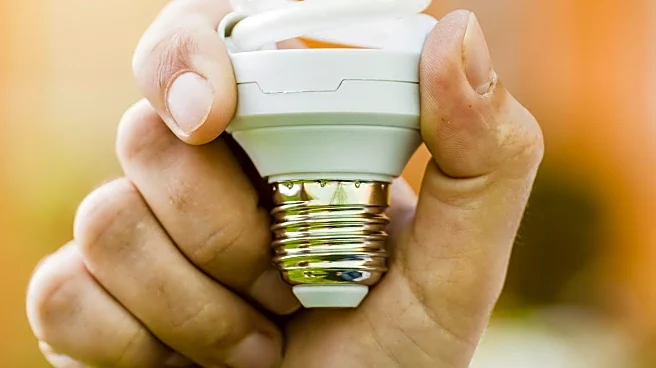What is the story about?
What's Happening?
As energy costs continue to rise, many Americans are seeking ways to reduce their utility bills. A recent article from CNET outlines practical strategies to cut down on power consumption without sacrificing comfort. One key recommendation is to unplug electronic devices when not in use, as they can still draw power even when turned off, a phenomenon known as 'phantom load.' This practice, along with using smart plugs and surge protectors, can significantly reduce energy usage. Additionally, investing in energy-efficient appliances, such as smart thermostats and LED light bulbs, can lead to long-term savings. The article also suggests optimizing household habits, like closing blinds during peak sunlight hours and using ceiling fans to circulate air, to further decrease energy consumption.
Why It's Important?
The rising cost of utilities is a significant concern for many U.S. households, with nearly 80% of adults expressing stress over their energy bills, according to CNET. Implementing energy-saving measures can alleviate financial pressure and contribute to environmental sustainability by reducing carbon emissions. The Department of Energy estimates that standby power accounts for 5% to 10% of residential energy use, highlighting the potential impact of reducing phantom load. By adopting these strategies, consumers can save money and decrease their carbon footprint, benefiting both their wallets and the planet.
What's Next?
As more consumers become aware of the benefits of energy efficiency, there may be increased demand for smart home technologies and energy-efficient products. This could drive innovation and competition in the market, leading to more affordable and accessible solutions. Additionally, public awareness campaigns and government incentives could further encourage the adoption of energy-saving practices, contributing to broader societal and environmental benefits.
Beyond the Headlines
The shift towards energy efficiency also raises questions about consumer behavior and the role of technology in daily life. As people become more reliant on smart devices, balancing convenience with sustainability will be crucial. Moreover, the emphasis on reducing energy consumption aligns with global efforts to combat climate change, underscoring the interconnectedness of individual actions and broader environmental goals.
















